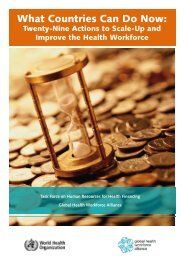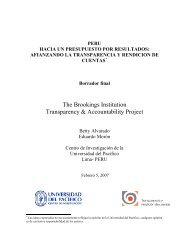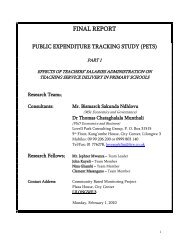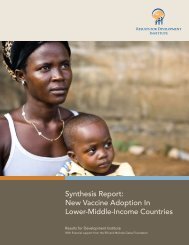Provider Purchasing and Contracting for Health Services_The Case
Provider Purchasing and Contracting for Health Services_The Case
Provider Purchasing and Contracting for Health Services_The Case
You also want an ePaper? Increase the reach of your titles
YUMPU automatically turns print PDFs into web optimized ePapers that Google loves.
esource use within designated priorities. Furthermore, adherence to financial <strong>and</strong> accounting<br />
systems is an aspect that is said be of significant focus in the assessment process <strong>and</strong> in<br />
monitoring of the contractual agreements.<br />
Quality Assurance <strong>and</strong> Accreditation. It was explained that, initially, all <strong>for</strong>ms of contracts—<br />
public to public <strong>and</strong> public to private—were intended to be overseen by the regulation of<br />
minimum st<strong>and</strong>ards that would be the benchmark <strong>for</strong> quality assurance. <strong>The</strong> st<strong>and</strong>ards would<br />
be used to assess contracted institutions, which would then be graded or accredited on the<br />
basis of the level of quality <strong>for</strong> funding <strong>and</strong> determination of the type of services the<br />
institutions or districts were able to provide. However, from the discussions <strong>and</strong> data<br />
collected, it is evident that this relatively useful <strong>and</strong> innovative approach has not been used<br />
extensively. Apart from the mission <strong>and</strong> mine facilities, very few private hospitals <strong>and</strong> clinics<br />
are accredited in Zambia.<br />
8. Partnerships between the Public Sector <strong>and</strong> Private For-Profit <strong>Provider</strong>s<br />
In spite of the limited contracting arrangements between the public <strong>and</strong> private <strong>for</strong>-profit<br />
providers, partnerships have been developed among these players. <strong>The</strong> partnerships relate to<br />
curative <strong>and</strong> prevention programs <strong>for</strong> specific diseases. <strong>The</strong>se are discussed below:<br />
Partnerships specific to malaria, TB, <strong>and</strong> HIV/AIDS programs<br />
<strong>The</strong> government has recognized the enormous potential that the private sector can contribute<br />
to case detection <strong>and</strong> treatment of TB, malaria, <strong>and</strong> HIV cases. <strong>The</strong>se diseases are among the<br />
top 10 causes of mortality <strong>and</strong> morbidity in Zambia. In a bid to reduce the incidence <strong>and</strong><br />
prevalence of these diseases, the government has entered into partnerships with the private<br />
<strong>for</strong>-profit providers <strong>and</strong> industrial hospitals. <strong>The</strong> main objective of the partnerships in<br />
curative services is to ensure that the private sector adheres to the national treatment<br />
guidelines by making appropriate health services accessible to all citizens.<br />
In all cases, the treatment of TB is free in Zambia. One of the objectives of the National TB<br />
Programme is to ensure uninterrupted supply of quality-assured anti-TB drugs <strong>and</strong> laboratory<br />
reagents throughout the country <strong>for</strong> treatment of TB patients. To promote adherence <strong>and</strong><br />
improve treatment outcomes, the four fixed-dose combinations has been introduced in all<br />
nine provinces <strong>and</strong> has been extended to some private <strong>for</strong>-profit health providers.<br />
This arrangement is made possible through the anti-TB drug supplies that are secured through<br />
GDF by the Ministry of <strong>Health</strong>. In this partnership, the Ministry of <strong>Health</strong> gives free TB<br />
drugs to selected private <strong>for</strong>-profit <strong>and</strong> industrial health facilities. Under the partnerships, the<br />
contracted facilities are in turn supposed to provide free treatment to the public. <strong>The</strong>y are<br />
supposed to charge consultancy fees only. According to the Ministry of <strong>Health</strong> <strong>and</strong> some<br />
respondents in private facilities, the private partners are supposed provide the government<br />
with in<strong>for</strong>mation on the utilization of these drugs.<br />
Regarding malaria, interviewees at the Ministry of <strong>Health</strong> stated in 2003 that the government<br />
revised the national malaria treatment policy. <strong>The</strong> aim of the policy is to provide access to<br />
more effective treatment <strong>for</strong> malaria. <strong>The</strong> new policy introduced the use of artemisinin-based<br />
combination therapy <strong>for</strong> uncomplicated malaria. <strong>The</strong> respondents further noted that the<br />
54
















